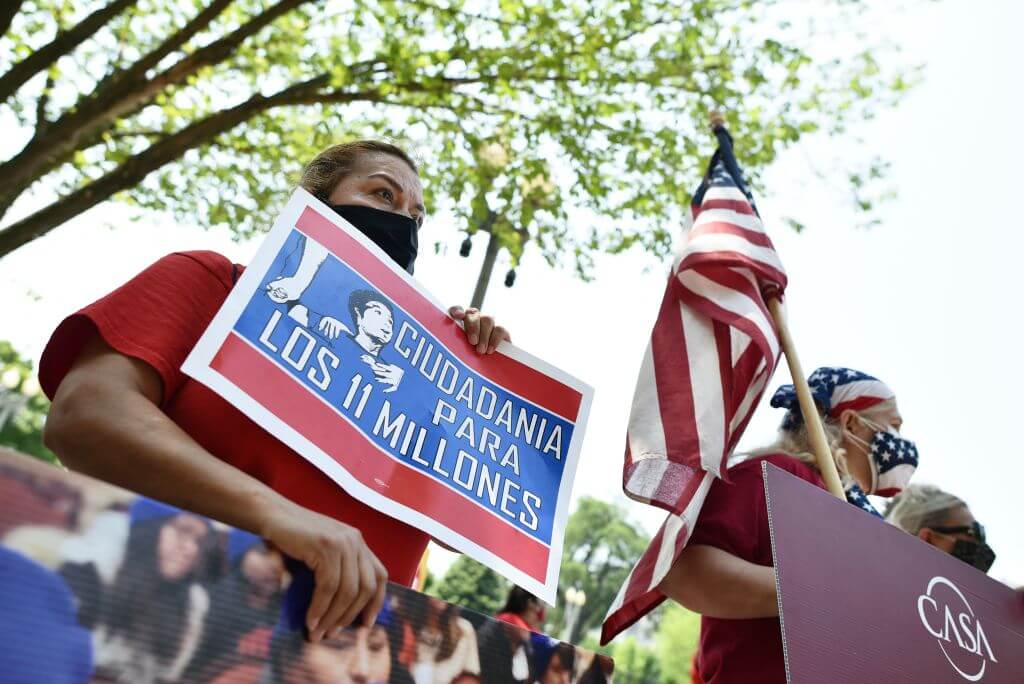
Constantin Mutu, the youngest known child separated from his family at the southern border. Photo via FX's The Weekly.
Family separation is not just a southern border issue, Michigan lawyers say. And it has come to the Mitten in surprising ways under President Trump.
YPSILANTI, Mich.—Children, toddlers, too young to vocalize feelings they were too young to understand, sat in Michigan courtrooms as their entire lives were decided. And they were the lucky ones. They had lawyers from the Michigan Immigrant Rights Center (MIRC).
They were in court because they, along with their caregivers, had been detained by Immigration and Customs Enforcement on the southern border. Because of a policy enacted by the Trump administration, those children were separated from their caregivers and treated as unaccompanied minors.
MIRC has represented children separated from families by the Trump administration’s “zero-tolerance” policy from across the age spectrum, including the youngest known victim of the policy, Constintin Mutu, who was only 4 months old.
“Most people in the country when they think about [family separation], they think about a southern border issue,” said MIRC Supervising Attorney Ana Raquel Devereaux.
But it was a policy that was felt across the country, including here in Michigan.
The Kids The Trump Administration Made Orphans
Devereaux and MIRC Staff Attorney Rebeca Ontiveros-Chavez told The ‘Gander that at the height of the Trump administration policy of family separation, more than 50 children were relocated to facilities in Michigan set up for minors who do enter the country unaccompanied.
“Because of the zero-tolerance policy, the kids that did not come unaccompanied were made unaccompanied by the government, by this policy,” explained Ontiveros-Chavez. “There are kids that come that are truly unaccompanied and these [foster care] systems that are in place are providing that care, and it’s really important [care] that actually supports them in their development.”
READ MORE: Trump Administration Knew What It Was Doing With Its Child-Separation Policy, Watchdog Report Says
Devereaux pointed out that even that system of care for unaccompanied minors isn’t without room for improvement, and MIRC happily works with groups attempting to better care for those children. Devereaux cautioned against taking anger at the policy out on the foster system in place for actual unaccompanied minors, but working with MIRC to help improve those situations.
Notably, all of the children in Michigan made unaccompanied by the “zero-tolerance” policy of Trump’s administration have had their cases handled. Most have been reunited with family, while some few requested not to be reunited. But all the kids separated from their caregivers at the border who were then sent to Michigan were able to get their desired outcome thanks to MIRC.
They’re the fortunate ones. The cases of 545 children separated from their families across the country have been impossible to resolve, effectively creating orphans of the Trump family-separation policy.
But MIRC was quick to point out that the “zero-tolerance” policy is not the only policy the immigration system employs to break families apart.
The Other Families Separated
While most of the attention surrounding family separation has focused on the highly irregular and controversial decision to treat accompanied kids crossing the border as unaccompanied and divide families, there are other situations that have a similar effect happening every day.
“The frustrating reality is that family separation happens every day, and it happens through the immigration enforcement system,” explained Devereaux. “Just because there’s a lack of public outcry and it doesn’t look the same, it’s [still] a really big lived reality for people.”
SEE ALSO: Raised by Immigrants, This Michigan Man Votes Because Others Can’t
Devereaux and Ontiveros-Chavez used the example of an undocumented immigrant pulled over for a traffic violation or a victim of a workplace raid by Immigration and Customs Enforcement (ICE). These everyday occurrences leave them in immigration detainment centers, which also effectively separate children from their parents.
“That’s family separation,” said Devereaux, “It may not look the same and people might not talk about it as much, but it is a daily lived reality of the immigration system, as it is at this time.”
That kind of separation is more commonly done throughout the country and is a result of the heavy use of detention, another approach championed by President Donald Trump and his administration. The president has been critical of policies that have allowed families to stay together while awaiting a court decision on their immigration status and has leaned on keeping those immigrants detained instead.
“What we see as family separation through the country is policies relating to the heavy use of detention,” explained Ontiveros-Chavez. “Whether here in Michigan or at the border, if families were processed and allowed to live together freely while they go through their immigration process, we wouldn’t be seeing the separation. But some of the detention realities at the border force families to choose sometimes between being detained together, which nobody should ever have to choose, or having a child be released under other rights that child might have.”
Immigration policies also separate children from caretakers if that caretaker is not the child’s legal parent. So a child immigrating with a grandparent might be deemed unaccompanied and separated from their family, Ontiveros-Chavez said.
RELATED: Biden Plans to Increase Immigration Again. This Could Be the Economic Boost the US Needs.
And just like with the “zero-tolerance” separations, the emotional impact of this is deep.
While MIRC’s attorneys didn’t want to speak for the specific experiences of their clients, they did say that children tend to be confused and emotionally scarred, potentially for life, by these separations, and parents feel a deep despair over the situation.
MIRC’s role in the reunification of these families, and those separated at the border, has been in overcoming the legal challenges preventing that reunification. It has fought hard, and won often. But it needs support and understanding from Michiganders.
How You Can Help MIRC Help Families
Of course, as a nonprofit, MIRC is always looking for funding, either from direct donations or through grants, but it also wants Michiganders to really understand the broader picture of immigration and that it isn’t just a southern border issue.
“This immigration system that exists in the United States was built for the purpose of promoting and sustaining white supremacy, and this administration has weaponized that,” said Devereaux. “The systems aren’t going to go away with a change in presidency.”
And, she added, the patterns in the immigration system used to sustain white supremacy aren’t even limited to the immigration system. In this way, immigration is one head of the hydra that is institutionalized, systemic racism in America, specifically she linked it to the boarding schools policies used on Indigenous populations which produced very similar effects.
“We would like to invite people to think more broadly about these issues and to recognize the context in our nation and the racist history in our nation that these systems live in,” she said.
UP NEXT: Watch: Michigan’s Spiking COVID Cases Will Hurt Black and Brown Communities Most
Changing the presidential administration will help, she said, but broader systemic reforms will be needed. She called on Michiganders to get involved with those reforms. To that end, Ontiveros-Chavez recommended following MIRC’s work on social media and its website, where state and federal policies impacting Michigan’s immigrant population are tracked.
And Ontiveros-Chavez warns against becoming complacent if Joe Biden is elected in November.
“No matter who is the president, it’s the system that’s set up for family separation through immigration enforcement,” she said. “Get involved in that advocacy and try to really redo the system of immigration.”
Politics

Teamsters and UPS Reach Tentative Deal to Avoid Strike, 340,000 Workers to Get Raises
The tentative deal represents a huge win for full- and part-time UPS Teamster workers, who would get significant pay raises and better working...



One Republican Senator Is Blocking 265 Military Promotions, Leaving the Marines Without a Confirmed Leader
Sen. Tommy Tuberville's decision means these military officers are not getting the pay raises they’re owed, cannot move their families to wherever...
Local News



Teamsters and UPS Reach Tentative Deal to Avoid Strike, 340,000 Workers to Get Raises
The tentative deal represents a huge win for full- and part-time UPS Teamster workers, who would get significant pay raises and better working...



One Republican Senator Is Blocking 265 Military Promotions, Leaving the Marines Without a Confirmed Leader
Sen. Tommy Tuberville's decision means these military officers are not getting the pay raises they’re owed, cannot move their families to wherever...




